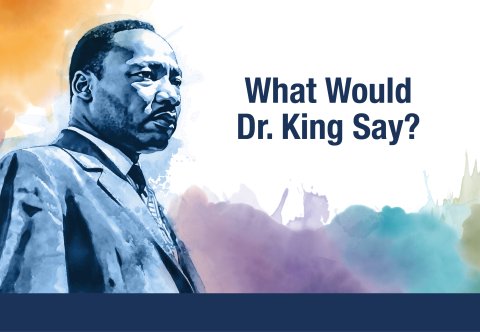
What would Dr. Martin Luther King, Jr. say? It's a good question to ask any time of year, especially this month. We will never know for sure, but he left a legacy of words that can give us clues—and inspiration.
As our nation celebrates the extraordinary life of Dr. King with a federal holiday, speeches, and service, I would like to reflect on Dr. King’s wisdom as it pertains to NIH’s efforts to foster a more inclusive biomedical and behavioral research enterprise.
Injustice in Health Care Access and Treatment
“Of all the forms of inequality, injustice in health is the most shocking and inhuman.”—Dr. Martin Luther King, Jr. (Chicago press conference, 1966)
As the COVID-19 pandemic clearly demonstrated, inequities in health care access and treatment disproportionately impact Black, Indigenous, and Hispanic communities. In addition, the cost and availability of care are not equal for everyone in the nation. For example, members of underrepresented groups more often experience missed or delayed diagnoses of dementia than White individuals, which results in delayed care.
Bending Toward Justice
“Let us realize the arc of the moral universe is long, but it bends toward justice.” —Dr. Martin Luther King, Jr. (Washington National Cathedral, 1968)
Evidence demonstrates that having different perspectives and approaches in research and medicine leads to more creativity, greater innovation, and better outcomes for everyone.
We need to have more people at the table, so we benefit from voices that reflect diversity in multiple dimensions. These may include geography, discipline, and personal experience, such as living with a disability or overcoming systemic barriers to educational advancement or access to health care.
And yet, even though efforts to enhance diversity, equity, inclusion, and accessibility (DEIA) are more driven by data, science, and passion than ever before, progress remains uneven. It swings back and forth like a pendulum.
Life’s Most Persistent and Urgent Question
“Life’s most persistent and urgent question is, ‘What are you doing for others?’” —Dr. Martin Luther King, Jr. (Speech in Montgomery, Alabama, 1957)
As I talk with people across the country about what is happening at NIH as the agency seeks to be more inclusive of the broad talent available to advance scientific knowledge, I always have more to say than time allows. This is because hundreds of people from every Institute, Center, and Office at NIH are deeply involved in DEIA efforts.
For example, five active funding opportunities have emerged from UNITE, the NIH working group charged with examining the NIH internal and external environment, and health disparities and minority health research with a racial and ethnic equity lens. The following broadly applicable opportunities help promote equity in the biomedical and behavioral sciences and address health disparities:
- Assessment of Climate at Institutions (ACt) Award (RC2, PAR-24-038)
- Research With Activities Related to Diversity (ReWARD) Program (PAR-23-122)
- Instrumentation Grant Program for Resource-Limited Institutions (RLI-S10, PAR-23-138)
- STrengthening Research Opportunities for NIH Grants (STRONG) (UC2, PAR-23-144)
- Science Education Partnership Award (SEPA) (PAR-23-137)—NIH expanded this previously existing opportunity to include support from 19 Institutes, Centers, and Offices.
In addition to reviewing these UNITE initiatives, I invite you to explore the redesigned COSWD website to learn about our Scientific Workforce Diversity Seminar Series (SWDSS), funding opportunities, and resources. At our next SWDSS on March 13, we will discuss the impact of team science on fostering innovation and creativity in science.
I am confident that the progress we are making today to enable NIH and NIH-funded institutions to benefit from the nation’s full range of talent will save lives tomorrow.

